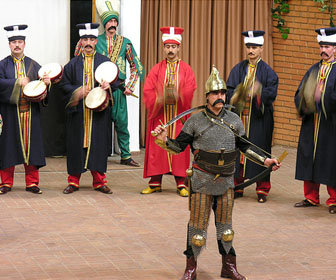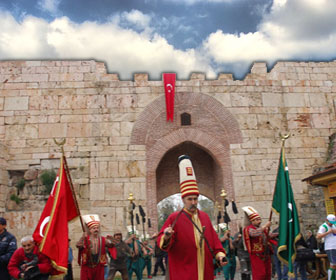 |
 |
| |
|
| |
OTTOMAN EMPIRE'S MILITRAY BAND, MEHTER TAKIMI

|
| |
 |

|
|
| |
|
|
|
| |
With Osman Gazi in 1299 began the mehteran to play
for ages in wars, shows and celebrations saying: "Blood is his hand,
blood is his sword, bare is his breast, full of trance his heart.
Passing with joy on the road to Allah"
In 1826 they were abolished, in 1911 they formed again a team, in
1914 they organized and took the name Mehterhane-i Hakani (Royal
Mehter Band).
They witnessed World War I and the War of Independence.
Beethoven and many western musicians composed music inspired by
them. And the Mehteran, also called Askeri Mizika Teskilati
(Military Music Organization) played for ages and continues to do so
with enthusiasm.
Ottoman military bands are thought to be the oldest variety of
military marching band in the world. Though they are often known by
the mahtar; mehter in Ottoman Turkish in the West, that word,
properly speaking, refers only to a single musician in the band. In
Ottoman, the band was generally known as mehterân, though those
bands used in the retinue of a vizier or prince were generally known
as mehterhane, meaning roughly, "a gathering of mehters", In modern
Turkish, the band as a whole is often termed mehter takimi ("group
of mehters").
The costumes worn by the mehterân, despite wide variance in color
and style, are always very colorful, often including high ribbed
hats which are flared at the top and long robes wrapped in colorful
silks.
Today, the music of the mehters is largely ceremonial and considered
by many Turks as a stirring example of heroism and a reminder of
Turkey's imperial past. Mehter Troop (Mehter Bölügü) is a band of
the Turkish Armed Forces and it performs at the Military Museum
(Askeri Müze) in Istanbul. |
|
| |
|
|
| |
|
|
|
<-Back
|
|
 |
|
